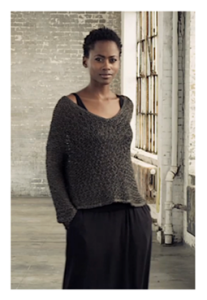I admit that when I read “The Trouble With Silk” at Beautycalypse, I was left wondering. I hadn’t ever considered the origins of some of my most favored clothing options over the years, as in the reality of how those silky threads are “farmed.”
 No one likes to think that cruelty of any sort is occurring at the origin of something that gives them pleasure, though I realize some of us – most of us – dismiss what we don’t want to think about.
No one likes to think that cruelty of any sort is occurring at the origin of something that gives them pleasure, though I realize some of us – most of us – dismiss what we don’t want to think about.
The article left me dismayed.
Then again, it took a splash of color in the Times Styles Section to send me searching the web for organic offerings when it comes to fashions, and wondering if “eco-fashion” would remain a fantasy, a nice-to-have, or an evolving – and affordable – reality.
Eileen Fisher
In fact, I was admiring an ensemble by Eileen Fisher, a designer who’s simple styles and pleasurable textures have always appealed to me, though certainly the prices can be a challenge. That said, the Fisher pieces in my wardrobe – three or four – date to my corporate days. They have more than paid for themselves in years of wear (without showing it), and styles that stand the test of time.
What caught my eye in the ad? A slouchy sweater in deep turquoise over a pair of “organic” denim jeans.
Hmm. Organic jeans. What have I been missing? What about the skinny jeans I love so much, the jean shorts I live in all summer? I never thought about their “organic” properties…
And incidentally, while modeled by a 20-something, I could easily see myself in the jeans and sweater outfit, working it with confidence, which is part of the beauty of the Eileen Fisher brand.
Healthy Eating? Sure. Healthy Fashion? Say What?
Organic food? It’s what I buy whenever I can, and more affordably than many might think. Healthy eating is extremely important to me. Still, I’d never thought about organic denim or organic fabrics of any sort, and intrigued by the advertising claim I went to the Eileen Fisher web site, a bit of an education in and of itself. And I say this with some embarrassment, as I have certainly passed by organic clothing at Whole Foods, no doubt without recognizing as much. Color me mortified.
In reading on the Eileen Fisher web site, I was surprised to see cotton described as:
Did you know that conventional cotton is considered the most toxic crops in the world, using 9.4 billion pounds of synthetic fertilizers and pesticides each year? Organic cotton isn’t just better for the earth, it’s a lot better.
I can’t say I’ve ever considered the ecological side of growing cotton before. I tend to choose “natural” fabrics assuming (blithely, naively) that they are better for the planet. Apparently, that assumption is flawed.
The Global Organic Textile Standard
As the Eileen Fisher site also mentions the Global Organic Textile Standard, I was curious about what that means. Here’s what I found:
The Global Organic Textile Standard (GOTS) is the worldwide leading textile processing standard for organic fibres, including ecological and social criteria, backed up by independent certification of the entire textile supply chain…
The standard covers:
… the processing, manufacturing, packaging, labeling, trading and distribution of all textiles made from at least 70% certified organic natural fibres. The final products may include, but are not limited to fibre products, yarns, fabrics, clothes and home textiles. The standard does not set criteria for leather products.
Do visit the GOTS site and read. There’s so much more!
Social Responsibility in Clothing Manufacture
 While I’ve made a distinct effort to consider child labor and foreign manufacturing in my consumer behavior, even as I run through my favorite fashion items – many of which are cotton, linen, and various wool-blend yarns – I’ve never addressed this issue. I assumed that “natural” was automatically better than synthetic fibers in terms of chemicals and the environment, but I thought no further.
While I’ve made a distinct effort to consider child labor and foreign manufacturing in my consumer behavior, even as I run through my favorite fashion items – many of which are cotton, linen, and various wool-blend yarns – I’ve never addressed this issue. I assumed that “natural” was automatically better than synthetic fibers in terms of chemicals and the environment, but I thought no further.
I certainly wasn’t pondering silkworms, much less how cotton or linen is grown, dyed, or processed and the extent to which pesticides are used.
As I’m not in a position to raise my own crops and produce my own cloth any more than I’m in a position to farm chickens or pesticide-free veggies, it’s my utter ignorance that caught me off-guard.
Organic Overload? Healthy Headache?
Sure, in a world where there is so much room for improvement (nice euphemistic phrase, isn’t it?), there are bigger fish to fry, so to speak.
We’re concerned with societal issues that include economics, culture, cultural values – issues of jobs, violence in our society, mental health, our own health and trying to make sense of “health care exchanges” – many of us may simply be seeking the least expensive option that nonetheless helps us feel good in our fashion selections.
Practicality. Reasonable cost. A dash of whimsy when we need it.
As for Eileen Fisher, I was already a fan. And now, even more so.
Conscience is Fashionable
Will I be tossing everything in my closet that I don’t think would meet a standard of social conscience I might aspire to?
Hardly. But I do appreciate additional knowledge, a greater flow of information, and ongoing conversation that encourages social conscience – even when it comes down to what we step into each morning as we head to the office, to school with the kids in tow, to the small balcony where we may be cultivating a tiny fruit bearing tree in an urban environment.
Ultimately, if I have options to purchase certified organic fabrics over non-organic and I can afford it, then that’s the route I’ll take. If I can choose exploitation-free and cruelty-free options for any purchase, that will be my choice. As a consumer, to say (or write) these things clearly feels important to me.
Do you feel informed in this area? Would you purchase clothing that comes with a “certified organic” label if it were available, affordable, and still to your taste?
Click the still above from EileenFisher.com to access the runway video.
You just taught me a lot! I did not know that about cotton…almost makes it feel dirty to put on…but like you I will put it on. However, I returned from Chicago with four Eileen Fisher pieces…which was my biggest shopping goal for the trip. I am even more pleased now to support this fabulous company and the woman who leads it. Thanks for the education!
I’m a big Eileen Fisher fan, have been for over 20 years. I find most of her styles to be ageless and there’s always the right thing for dressing up or down! And, it’s been interesting to see her line of Organic wear expand.
I agree, Walker! With both you and Pam!
Thanks for the reminder. My fabric of choice is linen and I layer, layer, layer. I scour the consignment stores and recently found a BEAUTIFUL Eileen Fisher double hued linen jacket, purple. It has been hard to find organic linen. For relaxing at home I choose organic cotton or hemp.
An Eileen Fisher gently used store just opened in my city. Gotta get there.
Oh Lunaboogie, I’m envious of the “gently used” store opening in your area! Quality really will “out,” won’t it. And socially responsible quality is the best of all worlds.
Who knew, D.A.? I never thought about the pesticides, etc. that are sprayed on crops like cotton. I have one bedspread that is organic cotton on my bed from Nordstrom that I love the feel of sleeping under. But that’s the extent of my awareness. And I don’t know that I’ve ever purchased any Eileen Fisher clothing. Will enjoy checking out your link. I’m with lunaboogie reader – I love consignment shops – both giving to and buying from. Great information.
I hadn’t given much thought to cotton as a possible danger to the environment, or about silk farms. I do know that the standards for “organic” and “natural” are all over the board…and exploited by many….so buyer beware!
“Natural” means little. It’s marketing. But when it’s “certified organic” (as in the case for the fabrics referenced), it’s a different matter.
Thanks for the education, Wolf. I am recently reading Women Of The Silk by Gail Tsukiyama which chronicles the hardship of young girls who are separated from their families to work in silk factories. Some of the passages are so heart-wrenching that I have to step away from the book.
It seems every choice we make has an implication for another. Such is the world.